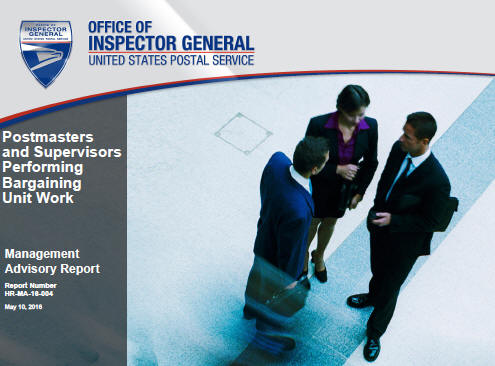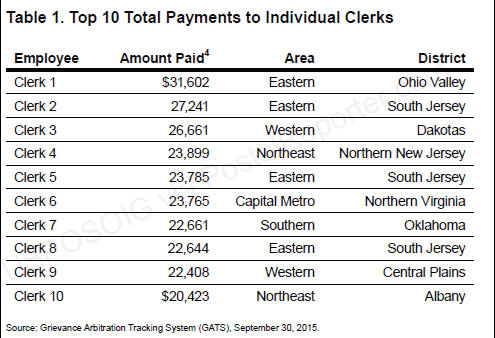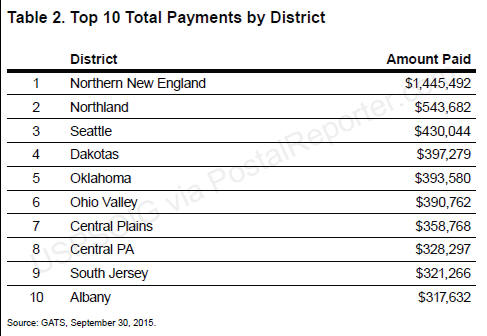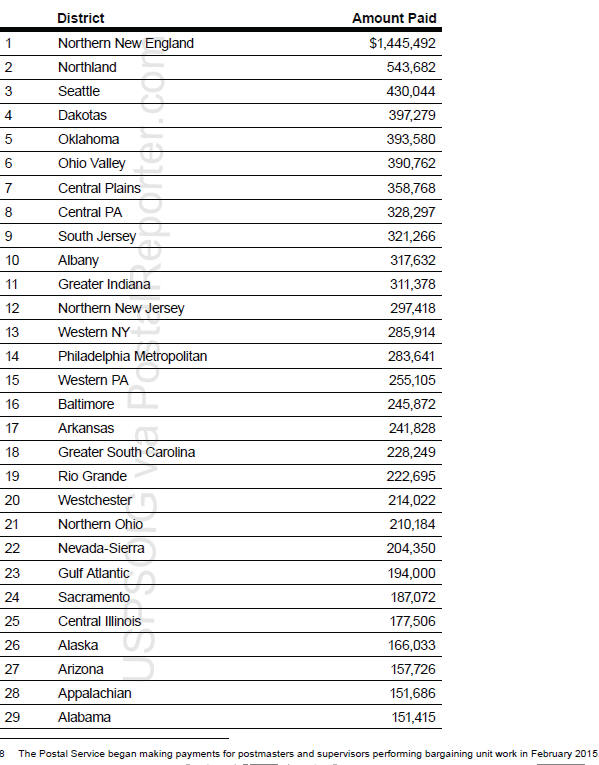
USPS OIG: Postmasters and Supervisors Performing Bargaining Unit Work, Management Advisory Alert
On December 5, 2014, the U.S. Postal Service reached a settlement with the American Postal Workers Union (APWU) for $56 million, resolving a long-standing dispute dating back to the 1970s. This dispute involved the number of hours postmasters and supervisors could devote to bargaining unit work. Bargaining unit work is the work of career or non-career employees who are represented by a labor organization (union) that negotiates with the Postal Service for wages, hours, and other terms and conditions of employment. Prior to the settlement there were no established workhour limits.
In the settlement, the Postal Service agreed to pay bargaining unit employees if postmasters and supervisors at level 18 post offices performed more than 15 hours per week of bargaining unit work. Level 18 post offices are small to medium-sized facilities managed by postmasters paid at an Executive Administrative Schedule 18 level. Postmasters at level 18 facilities may remotely manage the operations of up to 10 post offices.
APWU Wins $56 Million Remedy for Postmasters Performing Craft Work
Postmasters and supervisors must record all hours spent performing bargaining unit work in an electronic web application and provide the information to the APWU. The APWU reviews the hours and identifies clerks eligible for payment when supervisory personnel exceed the 15 workhours per week limit. The Postal Service pays the identified clerk. Clerks are paid at the appropriate rate, which could include overtime or other forms of increased pay rates. Clerks are eligible to receive payment even if they were on leave when the violation occurred. These payments are additional to the clerk’s salary.
Our objective was to assess the Postal Service’s management of workhours for postmasters and supervisors performing bargaining unit work.
What the OIG Found
The Postal Service did not effectively manage workhours for postmasters and supervisors performing bargaining unit work to ensure they complied with the agreement and controlled costs. Specifically, postmasters and supervisors exceeded the 15 workhours per week threshold by 829,484 hours from December 2014 through September 2015. As a result, the Postal Service made payments totaling about $11.2 million.
Our analysis of the payments showed that total payments made to the ten clerks who received the largest payment amounts ranged from $31,602 to $20,423, with the single largest individual payment being $23,899.

Payments were widespread, occurring in five of seven areas and 61 of 67 Postal Service districts. The Northern New England District paid over $1.4 million, which was the largest total payment made per district. Overall, these payments were made due to vacant clerk positions that took months to fill, worksharing between clerks and postmasters, clerks detailed to other facilities creating staff shortages at assigned facilities, or clerks detailed to supervisory positions instead of lead clerk positions.
Additionally, employees in three of the 61 districts used the wrong grievance code to process payments. The remaining six districts did not make any payments for the period reviewed.
 Although the agreement for postmasters and supervisors performing bargaining unit work was effective December 5, 2014, officials did not provide training and launch the electronic web application for postmasters and supervisors to record their bargaining unit workhours until March 2015. Additionally, some postmasters and supervisors continued to assume all payments were automatic and did not realize they could evaluate situations to determine whether there were emergencies or extenuating circumstances that could impact payments.
Although the agreement for postmasters and supervisors performing bargaining unit work was effective December 5, 2014, officials did not provide training and launch the electronic web application for postmasters and supervisors to record their bargaining unit workhours until March 2015. Additionally, some postmasters and supervisors continued to assume all payments were automatic and did not realize they could evaluate situations to determine whether there were emergencies or extenuating circumstances that could impact payments.
Finally, officials in three districts that used the wrong code were not aware of the proper code to record workhours for postmasters and supervisors performing bargaining unit work until we brought it to their attention during the review.
To further identify and address systemic issues regarding postmasters and supervisors exceeding established limits for performing bargaining unit work, a cross-functional team met during the week of August 10, 2015, and created an action plan to address staffing shortages and developed tools to track and monitor bargaining unit workhours, including standard operating procedures for the payment process. Additionally, they provided detailed guidance for postmasters and supervisors to manage their bargaining unit workhours.
Due to management’s actions, the number of hours exceeding the 15 workhour per week threshold for postmasters and supervisors performing bargaining unit work decreased by 65 percent from October 1, 2015 to March 4, 2016. However, the Postal Service must continue to monitor staffing and workhours and payments and provide guidance to field offices to reduce the risk of making unnecessary and fraudulent payments.
What the OIG Recommended
We recommended management continue to monitor vacancies and postmaster and supervisor workhours used to perform bargaining unit work and related payments. We also recommended they continue providing guidance to field offices to ensure they comply with the established agreement and communicate to postmasters and supervisors that situations due to emergencies or extenuating circumstances should be reviewed to determine the validity of payments.
The unions must be a lot more vigilant if this crap continues. First, managers doing craft work are salaried, and get no more pay for doing clerk work. They do create situations of ripping people off of man hours and pay, and if the problem is widespread enough it can affect staffing, and when offices are understaffed, it leads to more cross craft violations.
I am sorry to say that there are a lot of union branches in all crafts where the leadership is either corrupt and in bed with management, piss poor and lazy who never want to file a grievance or do any real work, or basically do not exist at all.
I could, but I won’t name branches where officers do nothing at all except suck up to management. There was a time a few years ago where I was still the branch president of the NALC and a widespread discipline/harassment program was going on. I worked for a week on it, preparing grievances for all who were written up, and was working on a class action harassment grievance when they backed off and removed the LOW’s. Another office where the same thing was going on did absolutely jack shit nothing. It isn’t just the officers to blame – branch members should have demanded action and remembered this incident when local elections came around, but like in almost all offices, most are not interested in doing anything to defend themselves.
Therefore, while we complain about all the things management does to make our work lives harder than they have to be, we fail to hold ourselves accountable for allowing the abuses to continue. We have the tools – contracts, manuals, Handbooks, RAA’s, NBA’s, Headquarters, yet we don’t use them. Management will not do the right thing on their own, ever. Being proactive on your rights as a postal employee is a must, and you have to accept responsibility too for the conditions you work in if you won’t fight back.
Postmasters continue to not report time spent on distribution, boxing PO Box mail, and other activities not automatically monitored by being logged into the RSS system. The next big payout will be all the time postmasters are working RCAs doing clerk work. Many offices have created NTFT positions for the clerk, but refuse to give them out of schedule pay to do the clerk work, but pay RCAs office time to do it. All a clear violation of the APWU contract and very widespread. Not to mention all the offices refusing to give clerks time to perform the cleaning duties. The settled MOU clearly states that clerks are not to perform cleaning “between customers”, however many PMs in small offices {including mine} insist that cleaning is the clerks “responsibility”, but refuse to give any time on the clock to do it. Management may feel they are saving money, but in the long run it is just going to lead to wasted time spent on grievances and payouts to the clerks in the end. Why not just do things the way USPS has signed their name that they will do it, instead oif letting the lowest level managers expose USPS to large grievance payouts?